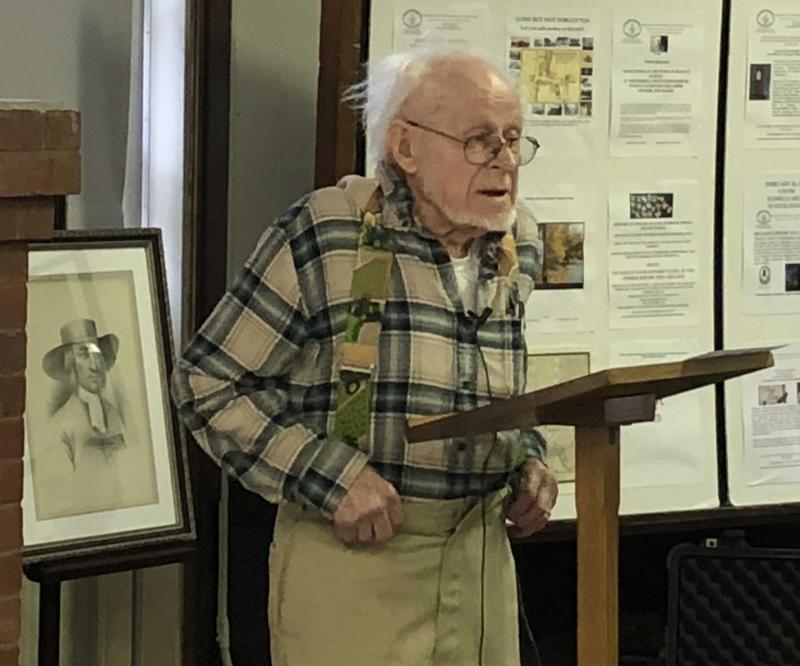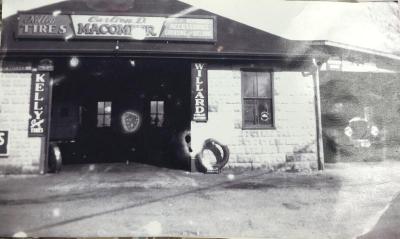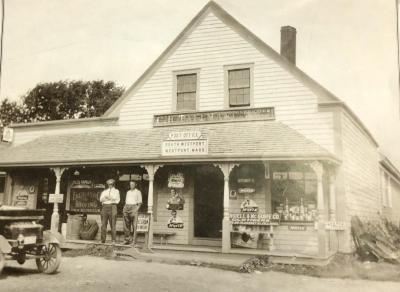Nonagenarian recalls growing up along the South Coast
Carleton “Cukie” Macomber remembers village circuses, life before electricity, and schooling at a one-room schoolhouse from his childhood growing up on the South Coast.
Macomber, now 92, recounted his youth growing up on the crossroads of Hixbridge and Horseneck Roads in Westport - an area dotted by small businesses, farms, and houses even in the 1920s - at a Dartmouth Historical and Arts Society lecture on February 4.
His father operated an automobile repair shop at the intersection. It was a popular and busy site, owing to the road’s use to reach Horseneck Beach in the summer - prior to the construction of Route 88.
The area was once home to the repair shop, a general store, two blacksmiths, a telephone exchange, several farms, and about 15-20 houses.
“It was the kind of place to go to,” Macomber said. “It was even listed on maps.”
Owing to the telephone exchange, Macomber’s home included telephone service long before electricity so his father could accept calls for his auto repair business. But, as was common with rural telephone networks at the time, it operated as a shared line with most of the village.
“Can you imagine running an auto repair shop on a party line with 11 other people on it,” Macomber said.
Back then, there was no online shopping or malls to go shopping. Instead, items that weren’t readily available at the local general store had to be sent away for via stagecoach. Macomber recalled writing shopping lists and sending them via stagecoach for merchants to pick up and bring back from New Bedford.
Macomber’s lecture was officially titled “How to Keep Your Children out of Jail,” to answer one key question: how the youth in the area kept out of trouble. The answer: plenty of family involvement.
A group of mothers in the neighborhood took it upon themselves to organize village-wide children’s events, including trips and special events. Macomber recalled a village circus all the children participated in, dressing up as clowns, circus animals, and performing for the neighborhood. They also hosted summertime excursions. Macomber fondly remembers traveling to Nantucket on a steamship.
Ice skating on the Westport River and a nearby pond was a pastime for many in the village. Macomber’s father would give him drums of old oil, which he brought to the river when it froze over and set on fire to provide lighting for nighttime skating. He also fondly remembers the time when, as a teenager, he got a riding tractor and pulled neighborhood kids along the river with it.
But Macomber’s youth was also marked by local and national turmoil. Much of his childhood was during the Great Depression, and he saw firsthand its effects locally.
“That was an awful struggle for a lot of people,” Macomber said. “They didn’t have jobs or money to buy anything.”
But Franklin Delano Roosevelt became President, ushering in his New Deal and helped the country - and the South Coast - heal. Many in the region worked for the Works Progress Administration, a government-funded employment program. WPA crews undertook many municipal projects in the area, including the construction of Westport’s Town Hall.
Prohibition was also in full swing at the time, although that did not stop liquor from making its way into the state through the waters of Buzzards Bay. Rum running put the area on the map in that regard, and Macomber heard many stories of the ways the trade worked. Lore at the time had it that an old farmhouse along the river was where rum runners dropped their loot off by boat.
Throughout the years, Macomber took on a lot of roles in the area. One job in his teenage years he could never forget was working on a local farm. With no electricity and plumbing, many included outhouses, which one day Macomber was tasked with cleaning.
“I opened that [outhouse] door and I lost my breakfast right down there,” Macomber recalled.
After that, Macomber’s career included a 16-year stint operating his own welding and fabrication shop. He also worked at the Prelude Corporation, a Westport-based lobstering company which made international headlines after suing the Soviet Union over its lobserting on the Atlantic coast.
He is now retired, and lives with his wife.















